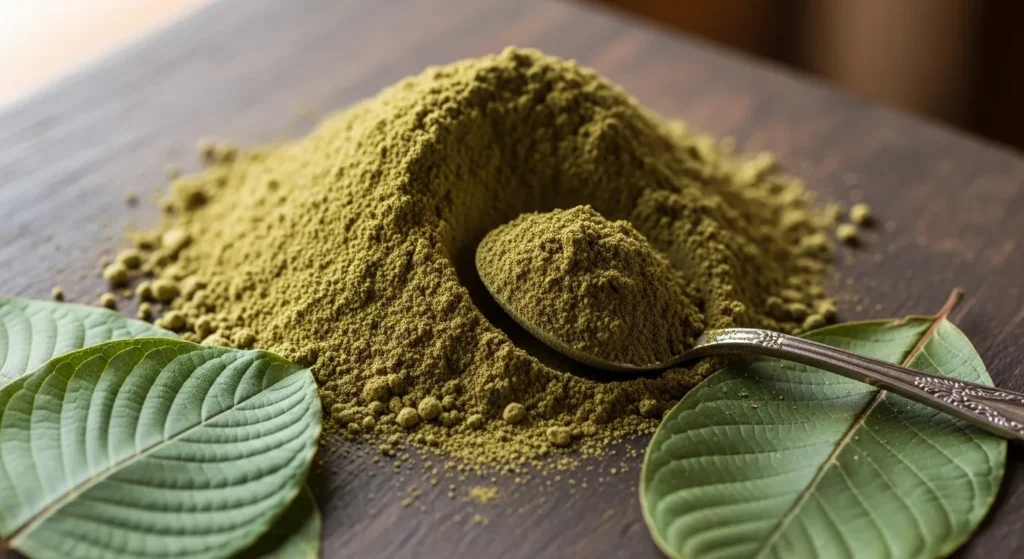Have you started noticing thinning hair or increased shedding, and wondered, Does kratom cause hair loss? Kratom, a herbal supplement known for its pain-relieving and mood-boosting effects, has recently been linked to unexpected side effects, including hair loss.
In this medically reviewed guide, we break down the connection between kratom and hair thinning, explore scientific findings, and offer solutions to protect your hair health. Backed by expert insight, this article gives you the clarity you need to take the next step confidently.
What Is Kratom and Why Do People Use It?

Overview of Kratom’s Origin and Uses
Kratom (Mitragyna speciosa) is a tropical tree native to Southeast Asia. Traditionally used by locals for pain relief and energy, kratom has gained popularity worldwide for its opioid-like effects, without being classified as a narcotic.
Common Forms and Dosages
Kratom is commonly available as:
- Powder
- Capsules
- Tea
- Extracts
Users typically take low doses (1–5 grams) for stimulation and higher doses (5–15 grams) for sedation and pain relief.
Legal Status and Controversies
Kratom remains legal in many parts of the world but is under scrutiny in others due to safety concerns and a lack of FDA regulation. Its use has surged in self-treatment of chronic pain, anxiety, and opioid withdrawal.
Understanding the Possible Side Effects of Kratom
Known Short-Term and Long-Term Effects
Common side effects include:
- Nausea
- Constipation
- Drowsiness
- Dry mouth
- Increased urination
Long-term use may lead to:
- Dependency
- Liver damage
- Weight loss
- Insomnia
- Hormonal disruptions
Commonly Reported Symptoms from Kratom Users
Frequent users have reported:
- Fatigue
- Mood swings
- Nutrient deficiencies
- Hair thinning or shedding (anecdotal)
Does Kratom Affect Nutrient Absorption or Hormones?
Some experts suggest that kratom may:
- Disrupt thyroid function
- Affect testosterone or estrogen levels
- Interfere with nutrient absorption (especially zinc, biotin, and iron)
These deficiencies could indirectly contribute to hair thinning.
Does Kratom Cause Hair Loss?
User Reports Linking Kratom to Hair Thinning
Numerous online forums (Reddit, Quora) contain first-hand accounts of users experiencing:
- Excessive hair shedding
- Thinning at the crown
- Slowed hair regrowth after prolonged kratom use
While not everyone reports this side effect, the concern is widespread.
Medical Literature Review: Is There Scientific Evidence?
Currently, no peer-reviewed study has directly linked kratom to hair loss. However, indirect factors such as:
- Nutritional depletion
- Chronic stress
- Hormonal imbalances
could plausibly explain this connection.
Potential Mechanisms — Stress, Malnutrition, or Hormonal Impact?
- Telogen Effluvium: Triggered by physical or emotional stress
- Hormonal Shifts: Kratom may act on opioid receptors that influence endocrine function
- Poor Nutrition: Kratom suppresses appetite, which may lead to protein, iron, or vitamin deficiencies
Comparison with Other Substances Linked to Hair Loss
- Opioids: Known to cause hair thinning in some users
- Antidepressants: May trigger telogen effluvium
- Kratom’s similar mechanism to these substances may pose comparable risks
Risk Factors That May Increase Hair Loss with Kratom
High Dosage and Chronic Use
Frequent use (daily or multiple times a day) appears more commonly associated with reports of hair loss.
Genetic Predisposition to Hair Loss
If you have a family history of male or female pattern baldness, kratom may accelerate the process.
Co-existing Conditions
- Thyroid dysfunction
- Anemia
- Autoimmune diseases
These conditions, when combined with kratom, may heighten hair loss risk.
Combining Kratom with Other Medications or Substances
Mixing kratom with antidepressants, stimulants, or alcohol may exacerbate hormonal disruptions, increasing the risk.
Expert Insights: What Do Doctors and Dermatologists Say?
Nutritional & Hormonal Assessment Advice
Hair specialists recommend:
- Blood tests for ferritin, TSH, zinc, vitamin D, and B12
- Hormonal panels if hair loss is persistent
- A dietary review if you’re using kratom long-term
Clinical Recommendations
- Reduce or stop kratom use if unexplained hair loss occurs
- Begin topical or oral hair loss treatments early
- Monitor regrowth progress after discontinuation
Real User Experiences and Case Examples
Hair Loss Recovery After Stopping Kratom
Many users report improved hair health after:
- Discontinuing kratom
- Improving diet
- Starting supplements like biotin, iron, and collagen
Stories of Continued Use Without Side Effects
Some users continue using kratom for years without experiencing hair thinning, highlighting variability in individual response.
What Reddit, Quora, and Forums Are Saying
Common themes include:
- Sudden hair loss after high-dose usage
- Significant regrowth after quitting
- Lack of awareness among kratom users about hair-related side effects
How to Protect Your Hair if You Use Kratom
Diet and Supplement Tips to Reduce Hair Fall
- Ensure sufficient protein intake
- Take hair-friendly supplements (biotin, zinc, collagen, iron)
- Stay hydrated and monitor overall caloric intake
Scalp Care and Anti-Hair Loss Products
- Use gentle, sulfate-free shampoos
- Consider minoxidil (topical) for regrowth
- Regular scalp massages to boost circulation
When to Seek Medical Help
- If you notice bald patches or persistent shedding
- If hair loss coincides with fatigue, mood swings, or appetite loss
- Consult a dermatologist or hair specialist
Safe Alternatives to Kratom with Fewer Side Effects
Herbal Alternatives
- Ashwagandha – for anxiety and cortisol control
- CBD – for pain and inflammation
- Turmeric – anti-inflammatory and safe for long-term use
Lifestyle Approaches for Pain or Anxiety Management
- Meditation and yoga
- Cognitive behavioral therapy (CBT)
- Acupuncture or physical therapy

FAQs About Kratom and Hair Loss
Can kratom cause permanent hair loss?
Not directly. Most reported cases suggest temporary shedding due to telogen effluvium, which often reverses with treatment.
How soon after taking kratom can hair loss occur?
Hair shedding typically begins 2–3 months after the triggering factor (kratom overuse) due to the hair growth cycle delay.
Will my hair grow back if I stop using kratom?
In many cases, yes. Discontinuing kratom and restoring nutrition often leads to regrowth within 3–6 months.
Are there kratom strains less likely to cause hair loss?
No strain has been clinically proven to avoid this side effect. However, lower doses and infrequent use may reduce risk.
Should You Be Concerned?
While there’s no conclusive scientific evidence that kratom directly causes hair loss, numerous user reports suggest a potential connection, especially in cases involving high doses and long-term use. Nutritional imbalances, stress, and hormonal changes are likely culprits. If you’re noticing hair thinning, it’s wise to evaluate your supplement habits and consult a professional.
If you’re using kratom and noticing unexplained hair loss, don’t wait. Book a consultation with Dr. Rana Irfan, ABHRS-certified hair restoration expert in Islamabad. Our clinic offers advanced diagnostics, expert-led treatment plans, and proven strategies to help you restore your hair and confidence.
